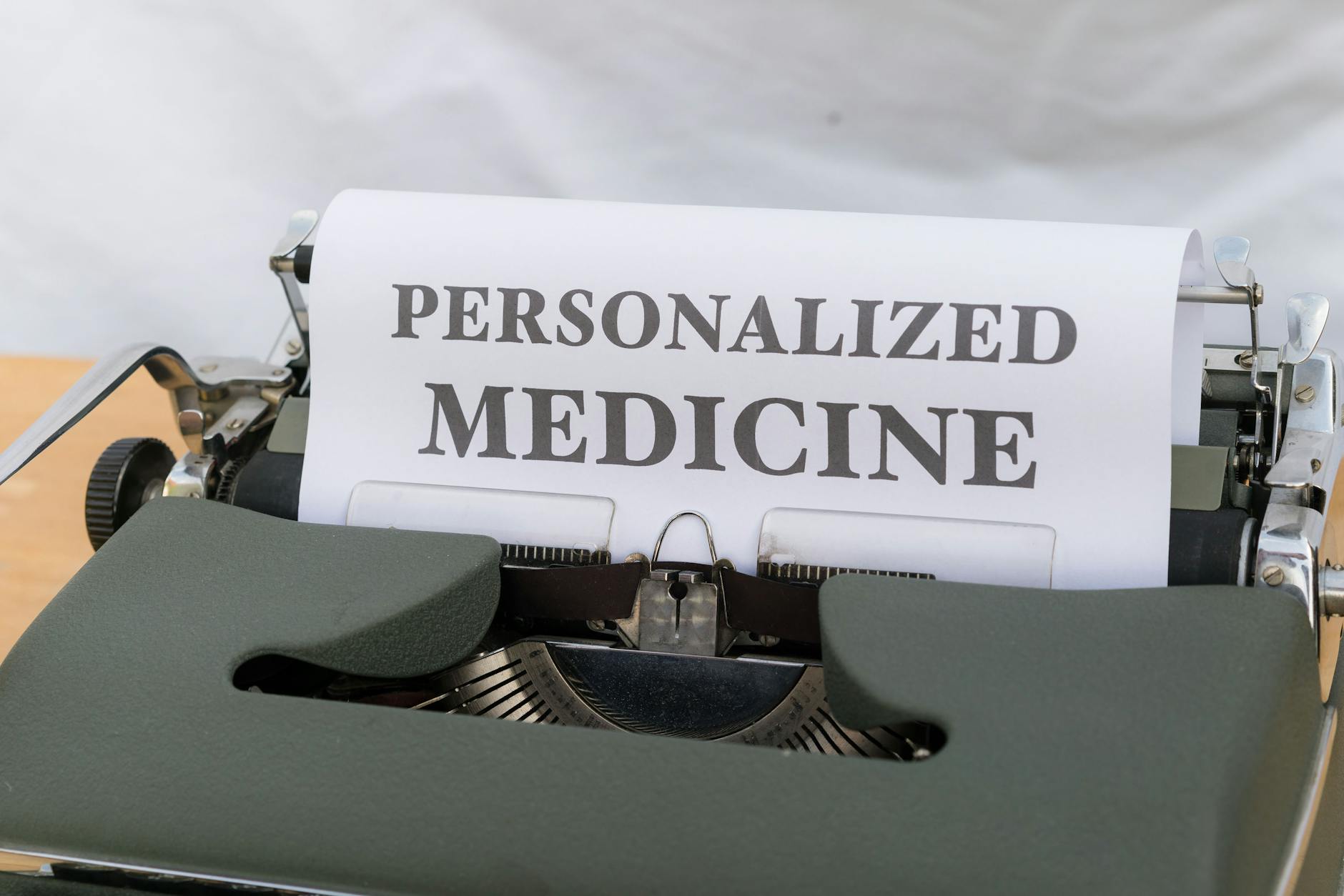Introduction
From lightning-fast diagnoses to personalized treatment plans, AI promises to transform every aspect of patient care. But as we stand on the brink of this healthcare revolution, questions arise: How will AI change the doctor-patient relationship? What ethical challenges will we face? And most importantly, are we ready for this seismic shift in medical practice?
In this post, we’ll explore the cutting-edge advancements in AI-powered diagnostics, robotic surgery, and personalized medicine that are set to define healthcare in 2025. We’ll also delve into the impact of AI on patient care management and tackle the ethical considerations that come with this technological leap. Buckle up as we journey into the future of healthcare—where human expertise meets artificial intelligence. 💉

Enhanced Medical Imaging Analysis
AI algorithms have revolutionized medical imaging analysis, offering unprecedented accuracy and speed in interpreting complex scans. By 2025, we expect to see AI systems capable of detecting subtle abnormalities that human eyes might miss, leading to earlier and more accurate diagnoses.
Reduced Diagnostic Errors
The integration of AI in diagnostics has significantly reduced human error rates. AI systems can process vast amounts of patient data and medical literature, providing physicians with comprehensive insights to support their decision-making process.
Personalized Treatment Recommendations
AI-driven diagnostics enable highly personalized treatment plans by analyzing individual patient data, genetic information, and treatment outcomes from similar cases. This tailored approach increases the effectiveness of treatments and minimizes adverse effects.
Early Disease Detection
One of the most promising aspects of AI in diagnostics is its ability to detect diseases at their earliest stages. By analyzing patterns in patient data and identifying subtle markers, AI systems can flag potential health issues long before symptoms appear.
| AI Diagnostic Feature | Benefits |
|---|---|
| Enhanced Imaging Analysis | Earlier detection, improved accuracy |
| Reduced Errors | Increased patient safety, cost savings |
| Personalized Treatments | Better patient outcomes, reduced side effects |
| Early Detection | Improved prognosis, lower treatment costs |
As we move towards more integrated healthcare systems, AI-powered diagnostics will play a crucial role in improving patient outcomes and streamlining healthcare delivery. Next, we’ll explore how AI is transforming surgical procedures through robotic advancements.
Robotic Surgery Advancements
As we explore the future of AI in healthcare, robotic surgery stands out as a field poised for significant advancements by 2025. These innovations promise to revolutionize surgical procedures, improving outcomes and patient care.
AI-Assisted Surgical Planning
AI algorithms are transforming pre-operative planning, allowing surgeons to create highly detailed, patient-specific surgical strategies. By analyzing vast amounts of medical imaging data and patient records, AI can:
-
Identify optimal incision points
-
Predict potential complications
-
Suggest the most effective surgical approach
This level of personalized planning significantly reduces surgical risks and improves overall outcomes.
Remote Surgery Capabilities: AI in healthcare 2025
The integration of AI with advanced robotics and 5G technology is making remote surgery a reality. By 2025, we can expect:
| Feature | Benefit |
|---|---|
| Low-latency connections | Real-time control over surgical robots |
| Haptic feedback | Enhanced surgeon’s sense of touch |
| AI-powered stability | Compensation for network fluctuations |
These advancements will bring expert surgical care to remote areas and enable collaboration between surgeons across the globe.
Precision and Accuracy Improvements
AI-driven robotic systems are continuously improving in precision and accuracy. Key developments include:
-
Enhanced computer vision for real-time tissue recognition
-
AI-powered motion stabilization to counteract hand tremors
-
Intelligent instrument selection based on surgical context
These improvements will lead to:
-
Reduced surgical errors
-
Minimized tissue damage
-
Faster patient recovery times
As we look towards AI in healthcare 2025 the synergy between AI and robotic surgery promises to redefine surgical care, making procedures safer, more accessible, and increasingly effective. Next, we’ll explore how AI is revolutionizing personalized medicine and treatment approaches.

As AI continues to revolutionize healthcare, one of the most promising areas is personalized medicine and treatment. This approach tailors medical decisions, practices, and products to individual patients, ensuring more effective and efficient care.
Genetic Analysis and Therapy Optimization
AI algorithms are revolutionizing genetic analysis, enabling rapid processing of vast amounts of genomic data. This capability allows healthcare providers to:
-
Identify genetic predispositions to diseases
-
Predict drug responses based on genetic markers
-
Optimize therapy selection for individual patients
| Traditional Approach | AI-Powered Approach |
|---|---|
| Generic treatments | Personalized therapies |
| Trial-and-error | Data-driven decisions |
| Limited genetic info | Comprehensive genomic analysis |
Predictive Health Modeling
AI-driven predictive health models are transforming preventive care by:
-
Analyzing patient data to forecast potential health risks
-
Recommending lifestyle changes to prevent disease onset
-
Alerting healthcare providers to early signs of health issues
Tailored Treatment Plans
With AI, treatment plans are becoming increasingly personalized:
-
Customized medication dosages based on individual patient characteristics
-
AI-generated diet and exercise recommendations
-
Personalized mental health interventions
AI-Driven Drug Discovery
AI is accelerating drug discovery processes by:
-
Analyzing molecular structures to predict drug efficacy
-
Simulating drug interactions to identify potential side effects
-
Repurposing existing drugs for new treatments
As we move towards 2025, these advancements in personalized medicine and treatment will significantly improve patient outcomes and revolutionize healthcare delivery. Next, we’ll explore how AI is transforming patient care and management beyond personalized treatments.

As we delve deeper into the impact of AI on healthcare, it’s crucial to examine how these technologies are revolutionizing patient care and management. AI is not only transforming diagnostics and treatment but also reshaping the way healthcare providers interact with patients and manage their facilities.
Enhanced Telemedicine Services
AI-powered telemedicine platforms are making healthcare more accessible than ever. These systems use natural language processing and computer vision to facilitate remote consultations, allowing patients to receive expert care from the comfort of their homes. AI algorithms can also triage patients, ensuring that urgent cases receive immediate attention. https://elixircare.net/patient-care/doctor-tele-consultations/
Streamlined Administrative Tasks
AI is significantly reducing the administrative burden on healthcare professionals, allowing them to focus more on patient care. Here’s how:
-
Automated appointment scheduling
-
Intelligent billing and coding systems
-
Voice-to-text transcription for medical records
Predictive Analytics for Hospital Management
Predictive analytics powered by AI are helping hospitals optimize their operations:
| Application | Benefit |
|---|---|
| Patient flow prediction | Reduced wait times |
| Resource allocation | Improved efficiency |
| Staff scheduling | Optimal workforce management |
Automated Patient Monitoring
AI-driven monitoring systems are revolutionizing patient care, especially for those with chronic conditions. These systems can:
-
Continuously track vital signs
-
Detect anomalies in real-time
-
Alert healthcare providers to potential issues before they become critical
Virtual Health Assistants
AI-powered virtual health assistants are becoming increasingly sophisticated, offering personalized support to patients:
-
Medication reminders
-
Lifestyle recommendations
-
Mental health support
-
Answers to common health questions
These advancements in AI in healthcare 2025 are not only improving patient outcomes but also enhancing the overall healthcare experience. As we move forward, it’s important to consider the ethical implications and challenges that come with these technological advancements.

As AI continues to revolutionize healthcare, it’s crucial to address the ethical implications and challenges that arise. Let’s explore the key areas of concern and potential solutions.
Regulatory Framework Developments
The rapid advancement of AI in healthcare necessitates robust regulatory frameworks. Regulatory bodies are working to strike a balance between innovation and patient safety.
| Regulatory Aspect | Current Status | Future Outlook |
|---|---|---|
| FDA Oversight | Developing AI-specific guidelines | Comprehensive AI regulation by 2025 |
| EU Medical Device Regulation | Includes software as medical devices | Stricter AI-specific rules expected |
| International Standards | ISO/IEC working on AI standards | Global harmonization efforts increasing |
Human-AI Collaboration
AI in healthcare 2025, The integration of AI in healthcare doesn’t mean replacing human professionals. Instead, it’s about creating synergies between human expertise and AI capabilities.
-
Augmented decision-making: AI assists healthcare providers in diagnosis and treatment planning
-
Skill enhancement: AI tools help medical professionals stay updated with the latest research and techniques
-
Workflow optimization: AI streamlines administrative tasks, allowing more time for patient care
AI Bias in Healthcare
Addressing bias in AI algorithms is crucial to ensure equitable healthcare outcomes for all populations.
-
Data representation: Ensuring diverse and inclusive datasets for AI training
-
Algorithm transparency: Developing explainable AI models for healthcare applications
-
Continuous monitoring: Implementing systems to detect and mitigate bias in real-time
Data Privacy and Security
As AI systems process vast amounts of sensitive health data, protecting patient privacy and ensuring data security are paramount.
-
Encryption and anonymization techniques
-
Blockchain technology for secure data sharing
-
Strict access controls and audit trails
With these ethical considerations in mind, AI in healthcare 2025, the health industry must navigate carefully to harness the full potential of AI while safeguarding patient rights and safety.

As we embrace these innovations, it’s crucial to address the ethical considerations and challenges that come with AI in healthcare 2025 implementation in healthcare. Striking a balance between technological progress and patient privacy, safety, and human touch in medical care will be paramount. Healthcare providers, policymakers, and technology developers must collaborate to ensure that AI serves as a tool to augment human expertise rather than replace it, ultimately leading to a more efficient, accurate, and patient-centric healthcare system.
Follow Us to learn daily insights in upgrading yourself with AI and Health: https://x.com/extendinghealth

